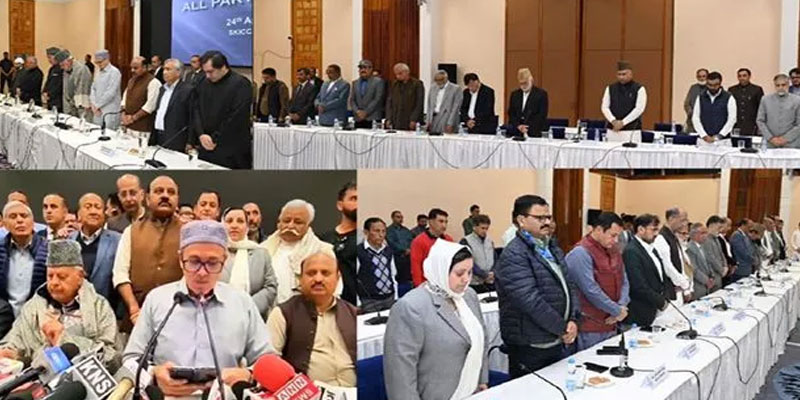A Unified Front Against Terrorism
In the wake of the horrifying terror attack in Pahalgam, Jammu and Kashmir, that claimed the lives of 26 tourists on April 22, the central government convened an all-party meeting to brief political leaders on the gravity of the situation and the way forward. Chaired by Defence Minister Rajnath Singh, the meeting underscored the need for national unity in the face of terrorism and provided an opportunity for cross-party solidarity in condemning the massacre.
Union Minister Kiren Rijiju, speaking after the meeting, said, “All parties said they were with the government and against terror.” The Intelligence Bureau and Home Ministry officials presented a comprehensive account of the situation, including ongoing efforts to prevent future attacks and the implications of the assault.
The Pahalgam Massacre
The attack took place in Baisaran, a picturesque tourist destination near Pahalgam, often referred to as “mini-Switzerland.” On Sunday afternoon, terrorists—suspected to be from a Lashkar-e-Taiba offshoot—opened fire on a group of unsuspecting tourists, killing 26 people and injuring several others. Among the deceased was one Nepali national, while the rest hailed from 14 different Indian states.
The massacre stunned the nation and provoked an international outcry. More critically, it disrupted the fragile sense of peace that had been taking root in Jammu and Kashmir, especially after years of relative calm and a resurgence in tourism.
Inside the Meeting: Briefings, Reactions, and Political Consensus
The government emphasized that the attack was aimed at disturbing the peace and undermining the progress made in the Union Territory. Intelligence Bureau Director Tapan Deka gave a 20-minute presentation outlining the attack, the nature of the perpetrators, and the measures being undertaken to boost security. Home Minister Amit Shah also addressed specific concerns raised by the political leaders.
Defence Minister Rajnath Singh outlined the sequence of events and the immediate response by security forces. Leaders from all political parties pledged support for any action the government deemed necessary—diplomatic or otherwise—against the perpetrators and those aiding them across the border.
Security Lapses and the Opposition’s Concerns
While the mood was largely unified, concerns were raised regarding lapses in local security protocols. According to sources, troops were present in Pahalgam but were not deployed due to a lack of information about the movement of tourists to Baisaran. The failure of tour operators and local hoteliers to inform authorities was cited as a critical gap that may have contributed to the tragedy.
Congress President Mallikarjun Kharge and Leader of Opposition Rahul Gandhi highlighted these lapses during the meeting. They extended full support for the government’s actions but called for greater accountability and better communication between civil administration and security forces. Kharge also emphasized that Prime Minister Narendra Modi should have personally attended the meeting to directly hear opposition concerns.
Diplomatic Fallout: India’s Tough Response to Pakistan
As evidence pointed toward cross-border involvement, the government initiated several strong non-military retaliatory measures. These included:
- Downgrading diplomatic ties with Pakistan
- Expulsion of Pakistani military attaches
- Suspension of the Indus Water Treaty (1960)
- Closure of the Attari land transit post
- Revocation of all active visas for Pakistani nationals in India
While these moves stop short of military retaliation, officials have not ruled out stronger action in the future, similar to the surgical strikes following the Uri attack and the air strikes post-Pulwama in 2019.
The Cost of Terror and the Need for Vigilance
The Pahalgam attack serves as a grim reminder of the enduring threat of terrorism and the importance of a united national front to confront it. While the government has demonstrated swift diplomatic response, the meeting revealed that internal coordination and intelligence-sharing mechanisms need urgent improvement.
Rahul Gandhi is scheduled to visit the injured in Anantnag, symbolizing political solidarity beyond party lines. Trinamool Congress MP Sudip Bandopadhyay echoed the sentiment, saying, “We are with the Center in the fight against terrorism. The country should fight it unitedly.”
In a nation as diverse as India, unity during times of crisis isn’t just a political necessity—it’s a moral imperative. As the government prepares for what may be a prolonged strategic battle, both militarily and diplomatically, it must also invest in tighter internal systems, stronger civil-security coordination, and a more transparent dialogue with all stakeholders.
The message from all political leaders was clear: India will not be intimidated. The perpetrators may have sought to fracture the nation’s spirit—but instead, they have sparked a renewed resolve for unity, vigilance, and justice.
(With inputs from agencies)





